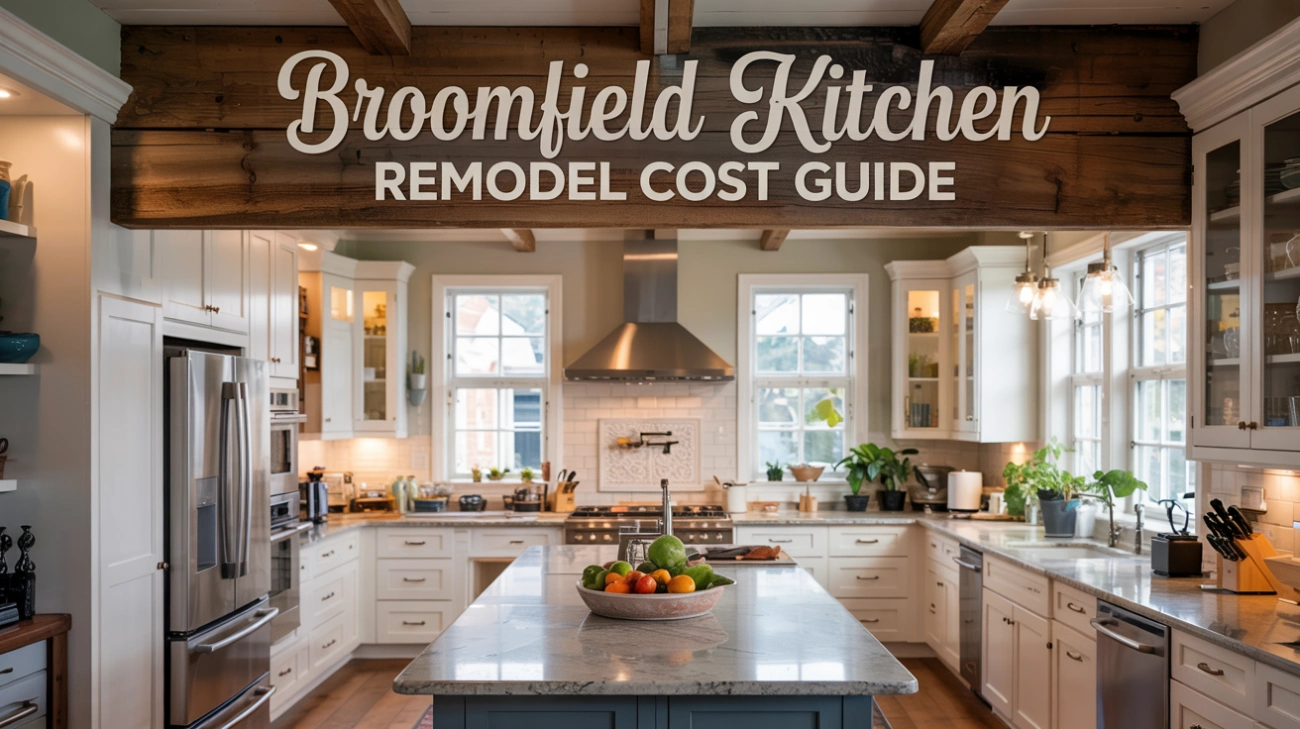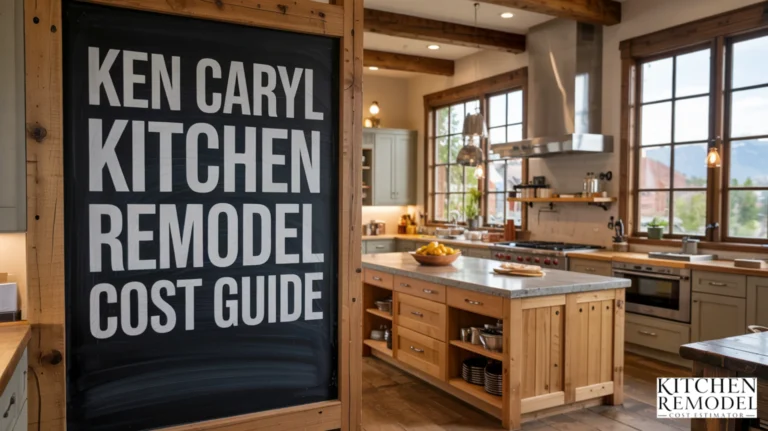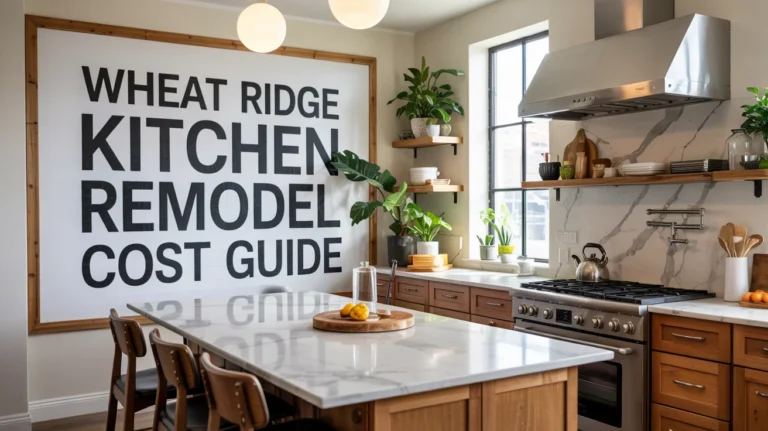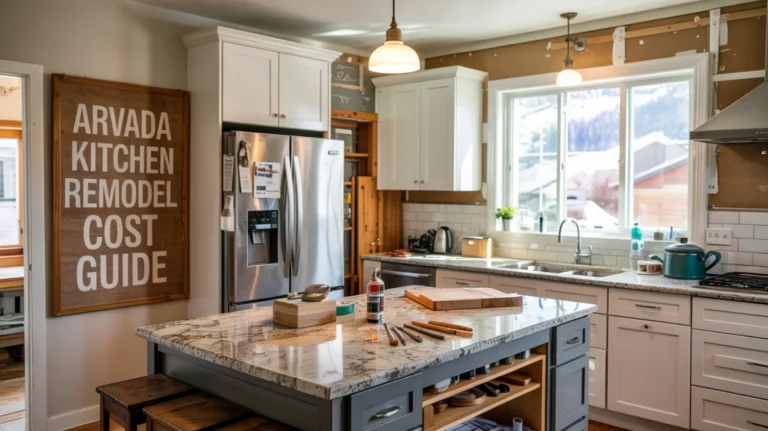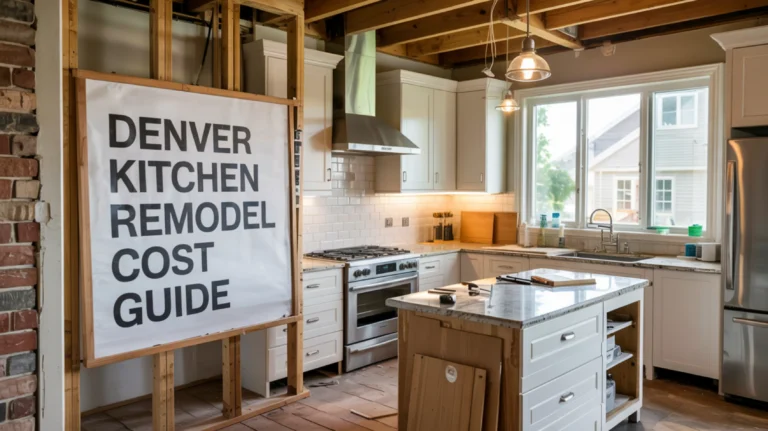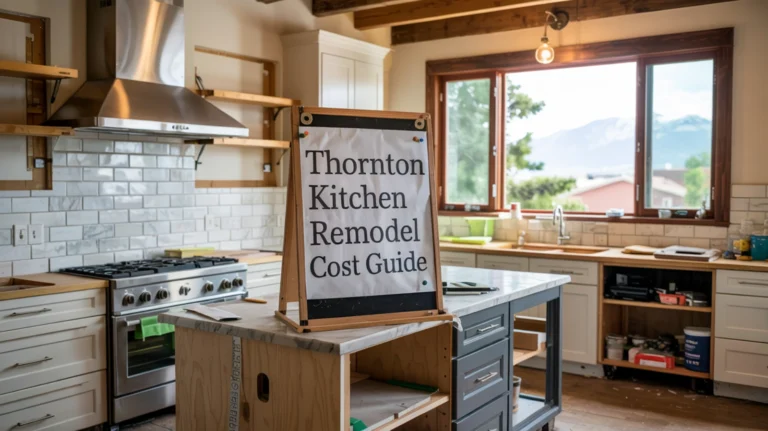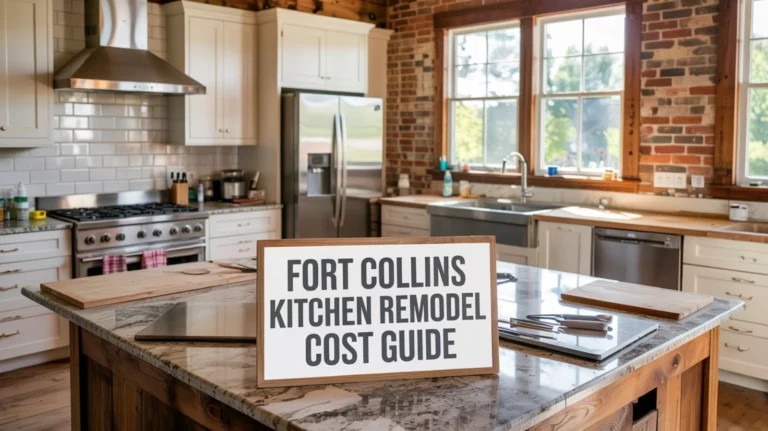Renovating a kitchen in Broomfield means navigating a market that’s influenced by both Denver’s premium pricing and our town’s more moderate cost structure. Colorado homeowners face unique considerations here, from permitting requirements that differ from neighboring communities to material availability that’s shaped by our position between urban Denver and more rural areas to the north.
So what will that Broomfield dream kitchen actually cost you?
The average kitchen remodel cost in Broomfield, Colorado ranges from $18,000 to $45,000. Basic remodels with stock cabinets and laminate countertops cost around $18,000. High-end remodels with custom cabinetry, stone surfaces, and upgraded appliances can exceed $45,000.
Kitchen Remodel Cost Estimator for Broomfield
Broomfield Kitchen Remodel Cost Calculator
Get an estimate for your kitchen renovation based on your specifications.
Estimated Kitchen Remodel Cost
This estimate is based on national averages and may vary based on your location, material availability, contractor rates, and other factors. Prices are estimates only and should be used for planning purposes.
Looking for more accurate costs in your area? Search for location-specific remodel costs.
Kitchen Remodel Cost Analysis: Broomfield, Colorado
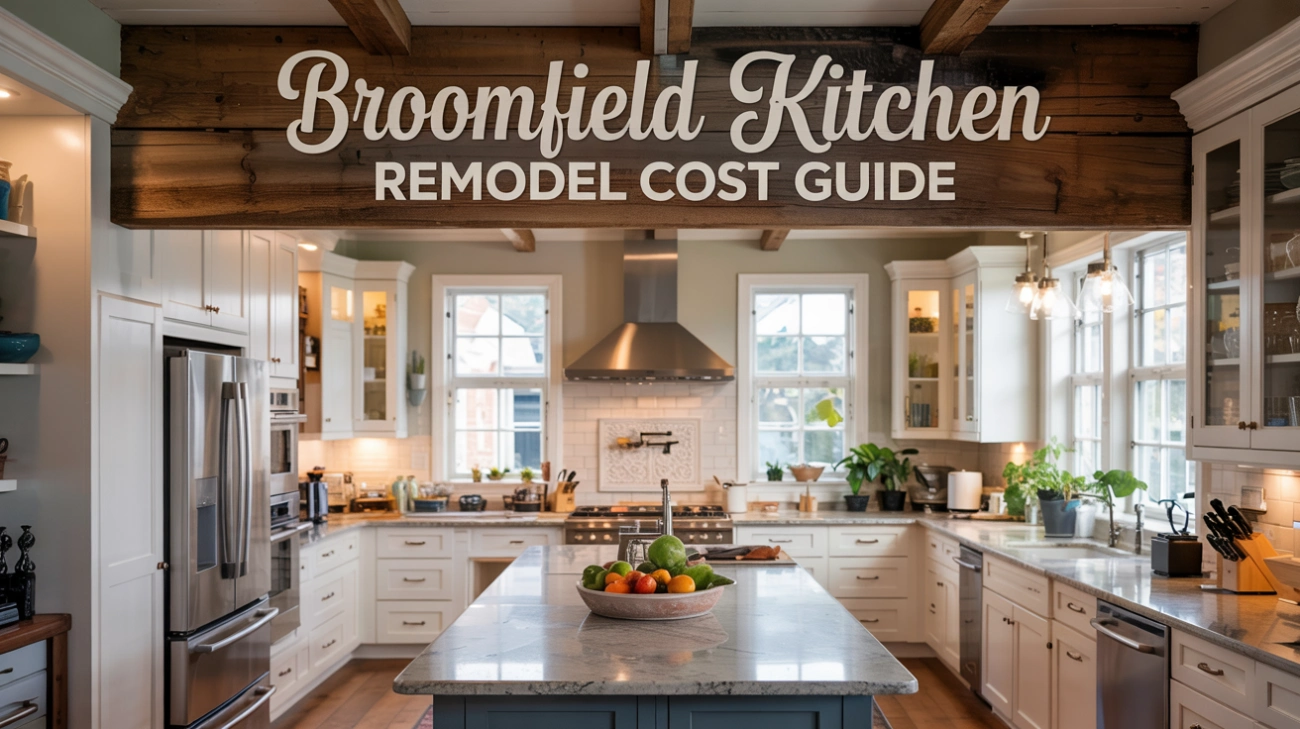
Overall Cost Ranges
Ever wondered what that dream kitchen will actually cost you in Broomfield? Let’s break down the numbers that will shape your renovation budget.
Your kitchen remodel cost hinges on three critical factors: how extensive your project is, what quality of materials you select, and just how many square feet your kitchen encompasses.
Initial research reveals Broomfield homeowners typically invest between $100 and $250 per square foot on their kitchen transformations. For an average kitchen, this translates to approximately $12,800 to $21,200 total.
That’s quite a range, isn’t it?
It needs to be—because “kitchen remodel” might mean anything from simply refreshing cabinet faces to completely reimagining your space with new everything.
Looking at nearby Denver gives us additional perspective. Denver kitchens typically cost between $190 and $375 per square foot to renovate. Given Broomfield’s close relationship with Denver’s market, expect similar pricing dynamics, though Broomfield might trend toward the lower end of these ranges.
How does the scope of your project affect these numbers?
In Denver, basic refreshes (think repainting cabinets rather than replacing them) typically run $7,000 to $10,000. Mid-range projects with better materials and some layout modifications generally fall between $11,000 and $25,000.
Kitchen size dramatically impacts your bottom line:
- Small kitchens (70-100 square feet) in Denver cost between $13,300 and $37,500
- Medium kitchens (100-200 square feet) typically range from $19,000 to $75,000
- Large kitchens (200+ square feet) can run from $55,000 to $112,500+
These categories provide practical benchmarks as you envision your project. Consider your kitchen’s square footage and whether you’re planning superficial updates or complete structural changes.
What about national averages? The typical home renovation project in America costs approximately $13,500, with per-square-foot costs ranging from $25 to $100. Major kitchen remodels nationally average between $25,000 and $62,000.
According to fresh 2025 data from Angi, most American kitchen remodels cost between $14,590 and $41,537, averaging $26,972.
Breaking this down further:
- Minor renovations: $10,000 to $20,000
- Major renovations: $20,000 to $65,000
- Complete overhauls: $65,000 to $130,000+
Nationally, kitchen remodels average $75 to $250 per square foot—surprisingly aligned with Broomfield’s range.
Getting even more local, remodels in the Westminster, Broomfield, Thornton, Arvada, and Northglenn area typically cost from $15,000 for basic upgrades to over $50,000 for high-end transformations.
But what if you’re dreaming of truly premium finishes?
A Reddit discussion suggests much higher outliers: low-end luxury projects at $600-$700 per square foot, mid-range luxury at $800-$1000 per square foot, and high-end exceeding $1200 per square foot. These represent the upper echelon of custom design with premium materials.
The bottom line? Kitchen remodels in Broomfield span from approximately $100 to $375+ per square foot, with total project costs ranging from under $10,000 to over $100,000 depending on scope, size, and materials.
Material Costs
%%{init: {'theme': 'base', 'themeVariables': { 'primaryColor': '#5F9EA0', 'primaryBorderColor': '#5F9EA0', 'primaryTextColor': '#fff', 'secondaryColor': '#8FBC8F', 'tertiaryColor': '#CD5C5C', 'lineColor': '#333333', 'fontSize': '16px'}}}%%
flowchart TD
A[Kitchen Remodel Material Costs] --> B[Cabinetry]
A --> C[Countertops]
A --> D[Flooring]
A --> E[Appliances]
A --> F[Plumbing Fixtures]
A --> G[Lighting]
B --> B1[Stock: $100-300/linear ft]
B --> B2[Semi-custom: $3,000-12,000]
B --> B3[Custom: $5,000-30,000+]
B --> B4[Refacing: $7,000-12,000]
C --> C1[Laminate: $20-80/sq ft installed]
C --> C2[Granite: $50-140/sq ft]
C --> C3[Quartz: $60-150/sq ft]
C --> C4[Other Materials]
D --> D1[Tile: $10-63/sq ft installed]
D --> D2[Hardwood: $6-22/sq ft materials]
D --> D3[Vinyl: $2.50-13/sq ft installed]
E --> E1[Basic Package: $2,500-4,000]
E --> E2[Mid-range Package: $4,000-8,000]
E --> E3[Premium Package: $8,000-37,000+]
F --> F1[Sink: $40-2,500]
F --> F2[Faucet: $25-600+]
F --> F3[Installation: $300-800+]
G --> G1[Recessed: $125-300 each]
G --> G2[Pendant: $100-300 each]
G --> G3[Under-cabinet: $65-220 each]
G --> G4[Other Fixtures]
classDef default fill:#f9f9f9,stroke:#333,stroke-width:1px;
classDef heading fill:#5F9EA0,color:white,stroke:#333,stroke-width:1px;
classDef cab fill:#8FBC8F,stroke:#333,stroke-width:1px;
classDef count fill:#CD5C5C,stroke:#333,stroke-width:1px;
classDef floor fill:#DAA520,stroke:#333,stroke-width:1px;
classDef app fill:#6495ED,stroke:#333,stroke-width:1px;
classDef plumb fill:#9370DB,stroke:#333,stroke-width:1px;
classDef light fill:#FF7F50,stroke:#333,stroke-width:1px;
class A heading;
class B,B1,B2,B3,B4 cab;
class C,C1,C2,C3,C4 count;
class D,D1,D2,D3 floor;
class E,E1,E2,E3 app;
class F,F1,F2,F3 plumb;
class G,G1,G2,G3,G4 light;Cabinetry Cost Analysis
When it comes to kitchen renovations, your cabinets might be the biggest ticket item in your budget. But just how much should you expect to pay?
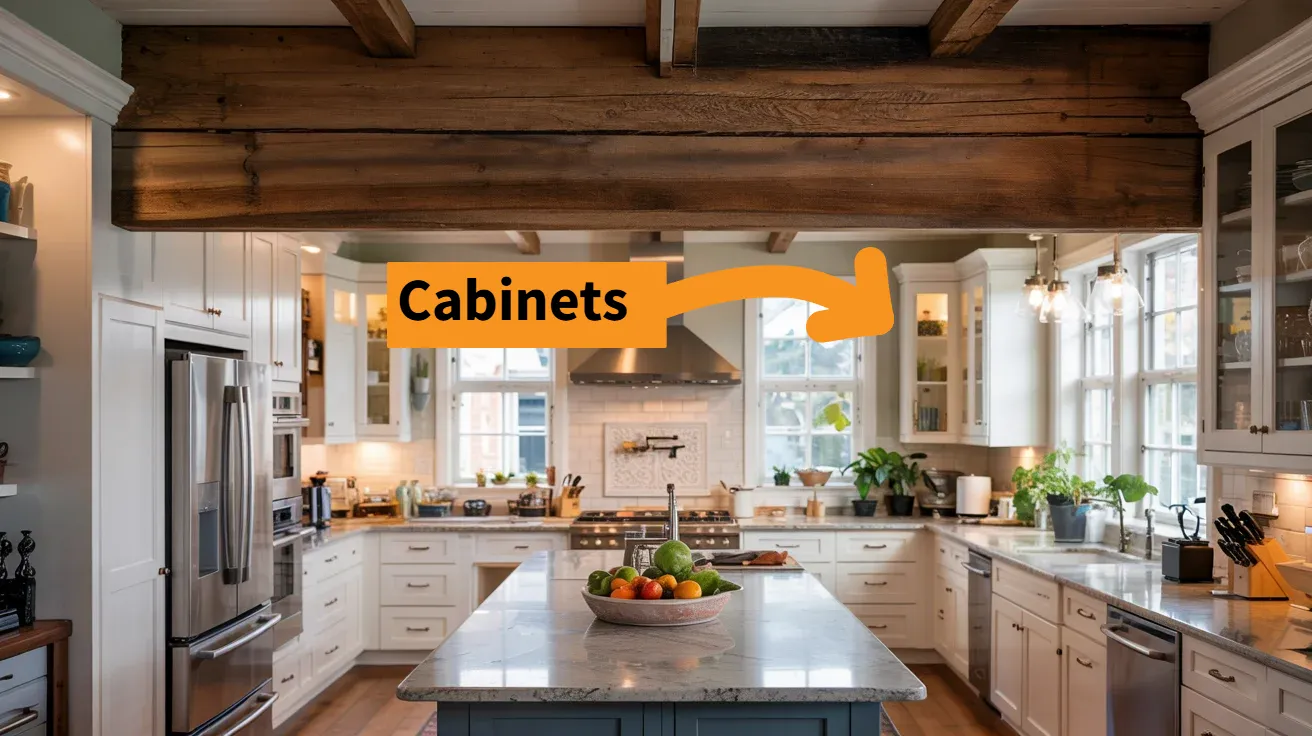
Across the country, cabinet costs vary dramatically based on customization level and materials. Stock cabinets (the pre-made, limited-option variety) typically run $100 to $300 per linear foot. Not bad, right?
Semi-custom cabinets—offering that sweet spot between personalization and affordability—generally cost between $3,000 and $12,000+ per project. These give you more size, style, and finish options without the premium price tag.
But what if you want something truly one-of-a-kind?
Custom cabinets, designed specifically for your space with premium materials, range from $500 to $1,200+ per linear foot. That translates to $5,000 to $30,000+ for an entire kitchen. Yes, that’s a significant investment, but you’re getting exactly what you want.
For the budget-conscious, ready-to-assemble (RTA) cabinets present a more affordable alternative at $1,000 to $8,000 per project. You’ll need to put these together yourself (or pay someone to do it), but the savings can be substantial.
Most American homeowners ultimately spend between $3,000 and $12,000 for mid-range kitchen cabinets. This chunk typically represents 30-40% of your total remodel budget.
What material you choose dramatically impacts both price and durability:
- Medium-density fiberboard (MDF) offers a budget-friendly option ($1,500 to $15,000 per project) and takes paint beautifully
- Plywood delivers better strength and moisture resistance ($3,000 to $25,000+)
- Solid wood provides unmatched durability and character ($5,000 to $30,000+)
- Laminate gives you easy-clean surfaces and modern looks ($1,500 to $12,000)
Style preferences also influence your bottom line:
- Modern cabinets: $2,000 to $12,000
- Shaker-style: $3,000 to $10,000
- Farmhouse-style: $1,500 to $8,000
- Glass-front cabinets: $500 to $7,000
Don’t forget installation costs—they’re substantial. Local cabinet installers typically charge between $50 and $450 per linear foot. That’s not a typo—installation can sometimes cost as much as the cabinets themselves.
Real Broomfield homeowners have paid between $6,623 and $19,698 for cabinet installation through Home Depot, depending on quantity and complexity. These real-world examples give you a concrete starting point for your budget.
Not ready to replace everything? Cabinet refacing presents a middle-ground option. Rather than gutting everything, refacing updates the visible surfaces while keeping the cabinet boxes intact. This approach typically costs between $7,000 and $12,000, with some sources citing averages around $6,925.
The bottom line for Broomfield cabinets: expect to pay anywhere from $1,000 for basic RTA options to over $30,000 for high-end custom builds, plus $50 to $450 per linear foot for installation. If you’re keeping your layout, refacing presents a cost-effective alternative at roughly $7,000 to $12,000.
Countertop Cost Analysis
Countertops make or break your kitchen’s look—and they can certainly break your budget if you’re not careful. What should you expect to pay in Broomfield?
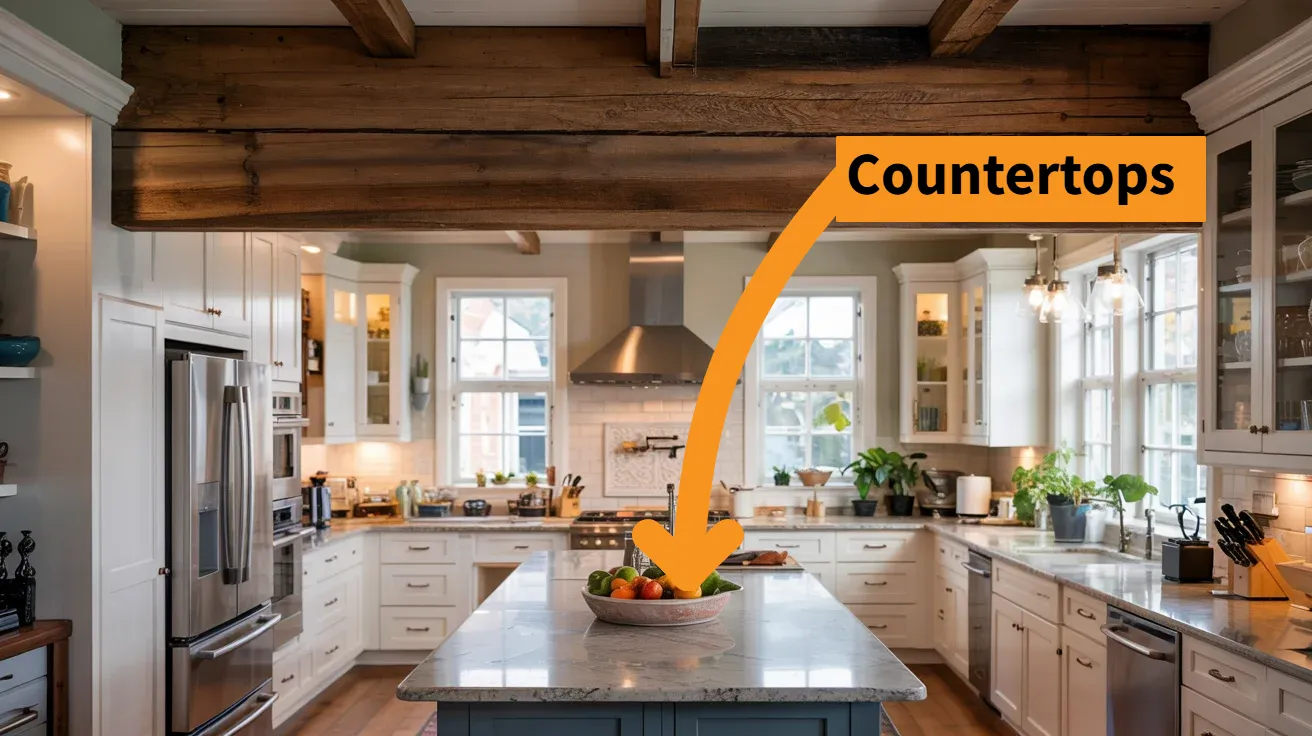
The material you choose will dramatically impact your costs. Let’s break down the options:
Granite, the perennial favorite, typically ranges from $10 to $140 per square foot nationally, averaging around $70. But not all granite is created equal.
Lower-grade granite costs $40 to $60 per square foot, while mid-grade options run $60 to $90. Seeking something truly spectacular? High-grade granite ranges from $90 to $140, and premium grades can exceed $250 per square foot. Total project costs typically fall between $1,800 and $7,500.
What about quartz, granite’s engineered competitor?
Quartz offers similar pricing ($15 to $130 per square foot, averaging $80) but with different benefits. It’s non-porous, more uniform in appearance, and requires less maintenance. Low-grade quartz starts at $30 to $50 per square foot, middle-grade runs $50 to $80, and high-grade costs between $80 and $150.
Installation for quartz typically adds $80 to $150 per square foot to your bill, covering materials, labor, and finishing. Many homeowners appreciate quartz for its consistent patterns and durability, making it worth the investment.
On a tighter budget? Consider laminate.
Laminate countertops provide remarkable bang for your buck, with an average installed cost between $20 and $80 per square foot ($600 to $3,200 total). Materials alone cost $10 to $50 per square foot, with installation adding another $10 to $30.
In Colorado specifically, mid-grade laminate averages around $40.10 per square foot installed. Formica, the best-known laminate brand, tends to cost slightly more ($40 to $80 per square foot).
Other options expand your choices further:
- Marble: $15 to $190 per square foot
- Soapstone: $20 to $70 per square foot
- Slate: $30 to $90 per square foot
- Limestone: $10 to $70 per square foot
- Travertine: $11 to $35 per square foot
- Corian: $20 to $75 per square foot
- Ceramic/porcelain tile: $1 to $40 per square foot
- Wood/butcher block: $18 to $100 per square foot
- Stainless steel: $60 to $100 per square foot
- Ultra-durable options (Dekton, porcelain): $69 to $120 per square foot
Don’t forget the installation details that can drive up costs. Edging treatments add up to $20 per linear foot, corner treatments average around $60 each, and different edge profiles carry varying price tags. Professional installation labor runs $30 to $40 per hour, with standard installations taking 3-7 hours.
The bottom line for Broomfield countertops? Expect a wide range: laminate at $20-$80 per square foot installed, granite at $50-$140, and quartz at $60-$150 including installation. Premium materials like marble can push these ranges even higher.
Flooring Cost Analysis
What will you walk on in your new kitchen? Your flooring choice affects not just your budget but your daily experience for years to come.
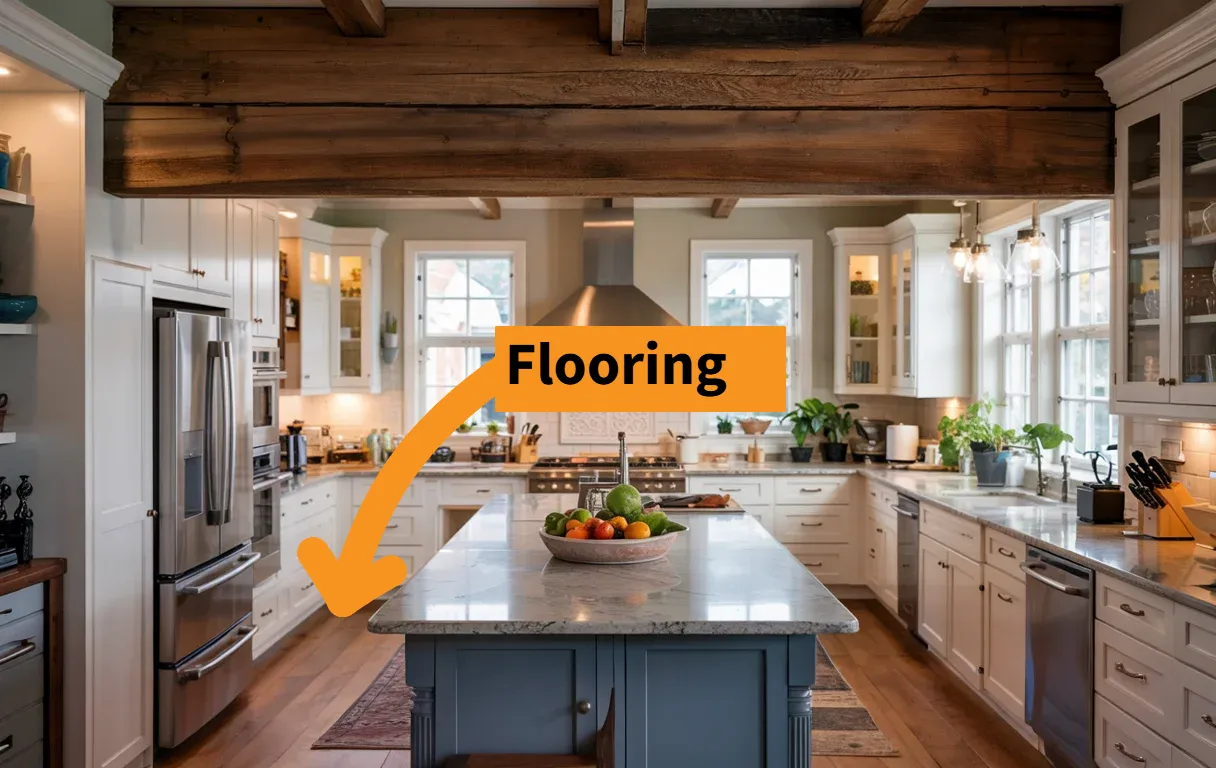
Let’s start with tile—the kitchen classic.
Tile flooring offers exceptional durability and water resistance, making it perfect for cooking spaces. The national average installed cost runs about $1,833 total, or $10 to $50 per square foot. Ceramic or porcelain specifically costs $13.50 to $63 per square foot installed.
Breaking this down further:
- Materials: $0.50 to $15 per square foot (varies by type)
- Labor: $4 to $25 per square foot
- For a typical kitchen (130-184 square feet): $1,300 to $9,200 total
Why such variation? The type of tile matters enormously. Ceramic and porcelain remain popular choices for their balance of durability and cost-effectiveness, while natural stone options command premium prices.
Perhaps you’re drawn to the warmth of hardwood?
Hardwood flooring creates a classic, inviting atmosphere, though it requires more care around water. Material costs range from $5 to $20 per square foot depending on species:
- Pine (softer, more casual): lower end
- Maple (harder, more uniform): mid-range
- Oak (durable classic): mid to high range
- Walnut (rich, distinctive): premium
The average installed cost falls between $6.40 and $7.80 per square foot, with installation labor adding roughly $3 to $4 per square foot. Nationally, hardwood floor installations average around $5,750 total.
Concerned about moisture? Consider engineered hardwood, which offers better resistance to humidity and spills than solid hardwood.
For the best of both worlds, many homeowners now turn to luxury vinyl plank (LVP).
Vinyl flooring, particularly LVP, has revolutionized kitchen flooring with its water resistance, durability, and impressive style options—all at competitive prices.
Installation costs for vinyl range from $750 to $11,000 total depending on square footage. Materials cost $1 to $7 per square foot, while installed costs typically run $2.50 to $13 per square foot.
LVP specifically costs between $7 and $12 per square foot installed. Real examples from nearby Superior, CO show kitchen vinyl projects costing $822 and $1,190 through Home Depot.
What makes LVP so popular? It combines the look of hardwood or stone with superior water resistance and lower maintenance—a winning combination for busy kitchens.
The bottom line for Broomfield kitchen flooring:
- Tile: $10 to $63 per square foot installed
- Hardwood: $6 to $22 per square foot for materials
- Vinyl: $2.50 to $13 per square foot installed (LVP typically $7 to $12)
Your lifestyle, aesthetic preferences, and budget will guide which option makes the most sense for your home.
Appliance Cost Analysis
Looking to outfit your kitchen with new appliances? The range of options—and prices—might surprise you.
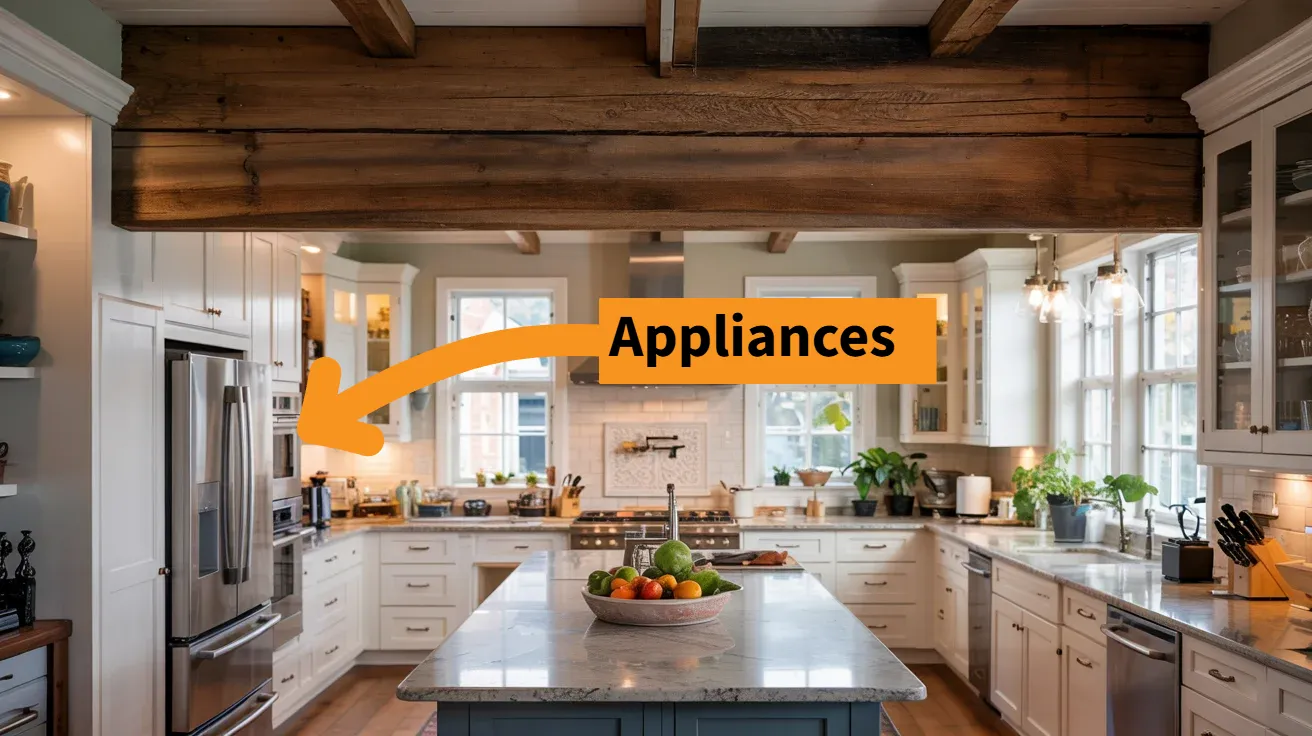
Kitchen appliance packages offer convenience and often savings compared to purchasing pieces individually. These packages typically include the essentials: refrigerator, range or separate cooktop and oven, microwave, and dishwasher.
What should you expect to pay? These packages vary dramatically, from approximately $2,492 to over $37,650.
Most stainless steel four-piece packages (the current standard) fall between $3,000 and $8,000. Brands like LG, Samsung, Frigidaire, and Whirlpool populate the lower and middle ranges, while Bosch, GE Profile, and KitchenAid command higher prices.
What explains this enormous price range?
It comes down to brand reputation, feature sets, technology integration, and build quality. That Sub-Zero refrigerator might cost five times more than a standard model, but it offers precision temperature control, better food preservation, and potentially decades longer lifespan.
Beyond the obvious price differences, consider researching energy efficiency ratings. Sometimes the more expensive appliance saves enough on utility bills to justify its premium over time.
While package deals offer convenience, don’t feel locked into them. Individual appliance costs can range from a few hundred to several thousand dollars each:
- Basic refrigerators start around $600, while built-in models can exceed $10,000
- Standard ranges begin around $500, with professional-grade models reaching $8,000+
- Dishwashers span from $300 to $2,000+
- Microwaves range from $100 to $1,500 depending on features and mounting options
High-end or professional-grade appliances will significantly increase your overall budget but may offer better performance and longer lifespans.
The bottom line for Broomfield: Expect to spend between $2,500 and $8,000 for a typical mid-range appliance package, though individual choices can push this much higher for premium brands or much lower for budget options.
Plumbing Fixture Cost Analysis
Your kitchen sink and faucet get more daily use than almost any other fixture in your home. What will quality options cost you in Broomfield?
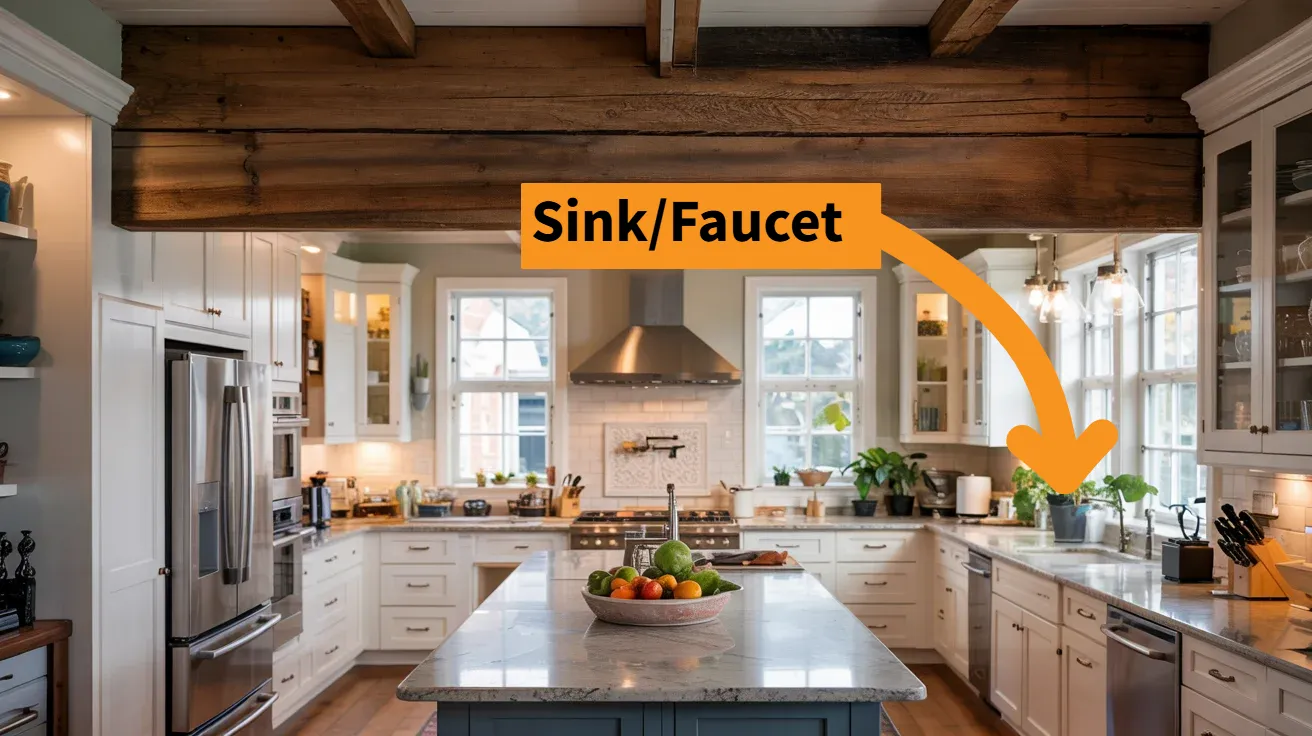
Let’s start with faucets—the focal point of your kitchen workspace.
Basic kitchen faucets begin around $25 to $75, offering simple functionality with fewer bells and whistles. Mid-range options jump to $100-$300, while premium models with advanced features range from $200 to $600+.
But the faucet itself is just part of the equation.
Installation for a straightforward faucet replacement runs $75 to $200, while more complex installations (requiring new plumbing lines or modifications) can exceed $500.
What about the sink itself?
A basic stainless steel kitchen sink—the most popular option—costs between $40 and $100 for entry-level models, with better quality options ranging from $125 to $450.
Looking for something more distinctive? Designer or commercial-style sinks range from $500 to $2,500+, offering deeper basins, thicker materials, or specialized configurations.
Traditional white porcelain sinks typically start around $100, offering classic appeal at a reasonable price point.
When it comes to installation:
- Average faucet installation: $260
- Average sink installation: $420
- Stainless steel sink installations: $189-$499 (average $289)
- Cast iron sink installations: $189-$599 (average $338)
Professional replacement of both a sink and faucet typically ranges from $300 to $800+, not including the fixtures themselves.
How do you choose the right sink? Consider:
- Material (stainless steel, composite, fireclay)
- Bowl configuration (single, double, or multi-bowl)
- Mounting style (undermount for a seamless look or drop-in for easier installation)
For faucets, key factors include:
- Finish (chrome, stainless, bronze, black)
- Style (traditional, contemporary, transitional)
- Features (pull-down sprayer, touchless operation, water filtration)
The bottom line for Broomfield: Budget between $100 and $3,000+ for a kitchen sink and faucet, with installation adding another $100 to $800 depending on complexity. A typical mid-range sink and faucet combination with standard installation will run about $750 to $1,200 all-in.
Lighting Fixture Cost Analysis
Good lighting transforms your kitchen from a functional workspace to a welcoming heart of your home. What will proper illumination cost you?
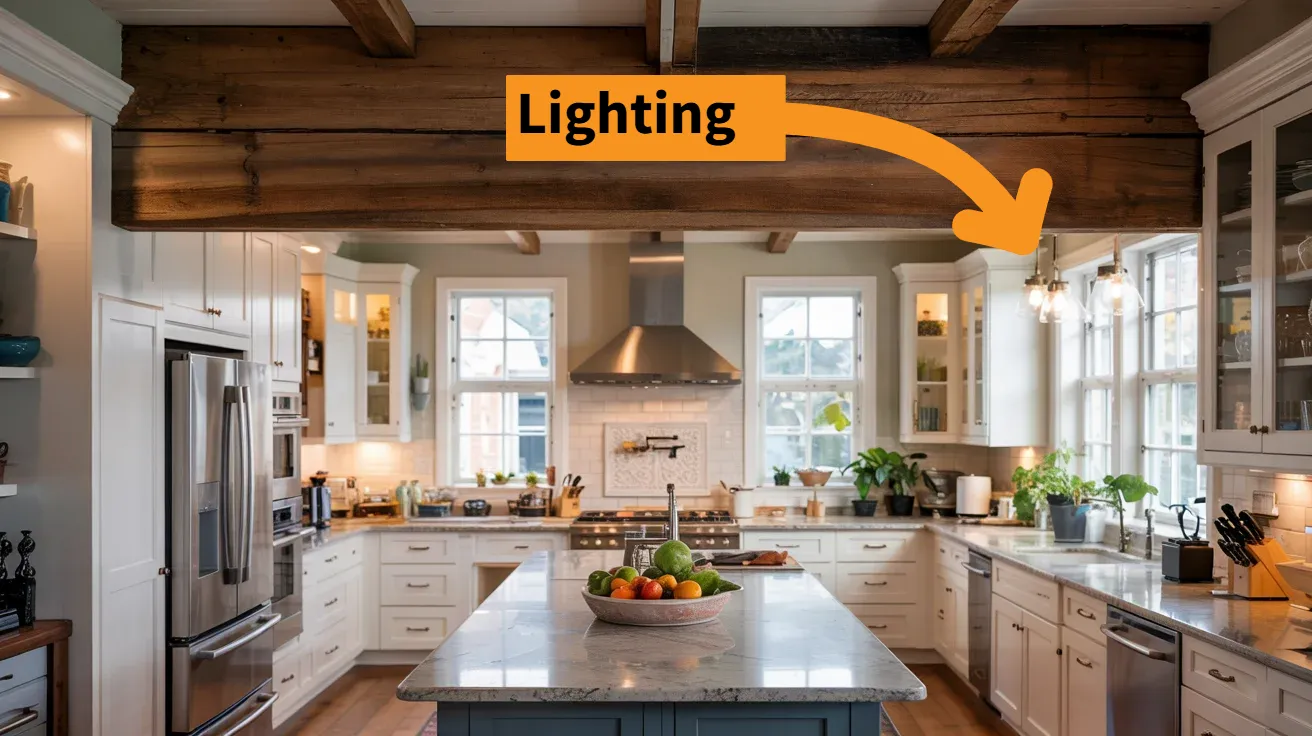
The price varies dramatically based on fixture type and quantity:
Recessed lights (those subtle ceiling spots) typically cost $125 to $300 per light installed. Most kitchens require multiple recessed lights for even illumination—typically 4 to 8 fixtures depending on your kitchen size.
Pendant lights—those stylish hanging fixtures perfect over islands or breakfast bars—range from $100 to $300 per light installed. These statement pieces not only illuminate your space but also define your style.
Under-cabinet lighting, essential for task lighting, generally costs $65 to $220 per fixture installed. These lights eliminate counter shadows where you prep food, dramatically improving functionality.
Looking for something different? Consider these alternatives:
- Track lighting: $100 to $300 per fixture installed
- Chandeliers: $215 to $3,400 per fixture installed
- Ceiling-mounted lights: $65 to $250 per fixture installed
- LED strip lights: $70 to $400 per strip installed
- Wall-mounted sconces: $100 to $250 per sconce installed
- Light bars: $200 to $500 per bar installed
The average cost to install a new light fixture runs around $586, though this ranges widely from $158 to $1,016 depending on complexity. The fixture itself might cost $90 to $215, with the installation labor adding another $127 to $347.
What should guide your lighting choices?
Experts recommend a layered approach with three types of lighting:
- Ambient lighting for overall illumination
- Task lighting for work areas
- Accent lighting to highlight features
LED options might cost more upfront but offer significant energy savings and longer lifespans—often 25,000+ hours compared to 1,000-2,000 for traditional bulbs.
The bottom line for Broomfield: Kitchen lighting can range from a few hundred dollars for basic fixtures to several thousand for comprehensive setups with chandeliers and extensive recessed lighting. Individual fixture installation can cost between $65 and $500+, with the average new fixture installation running about $586.
A typical mid-range kitchen lighting package with a mix of recessed lights, pendants, and under-cabinet lighting will cost approximately $1,500 to $3,000 installed.
Labor Costs
General Contractor Costs
Ever wondered why labor costs so much in a kitchen remodel? Here’s the reality: labor typically accounts for 40-60% of your total project cost.
Yes, that’s right—potentially more than half your budget goes to the hands that build your dream kitchen.
For basic remodels, labor represents around 45% of the total. As projects become more complex or customized, this percentage often climbs to 60% or higher.
This underscores why getting multiple detailed bids is crucial for understanding the true cost of your project. Two contractors might quote significantly different labor rates for the same work.
The national average for a major kitchen remodel (materials and labor combined) ranges from $25,000 to $62,000. Within this range, labor clearly represents a substantial portion.
What about hourly rates? General contractors typically charge between $50 and $150 per hour in Broomfield. The specific rate depends on:
- The contractor’s experience level
- Their specialization
- Local market rates
- Project complexity
For larger kitchen projects, most contractors provide comprehensive bids rather than charging hourly. This project-based approach gives you better budget predictability.
Several reputable remodeling contractors operate in Broomfield, though specific labor rates vary by company. To get accurate estimates, you’ll need to contact contractors directly.
Where can you find reliable contractors? Online directories like Angi (formerly Angie’s List) and HomeAdvisor can help identify reputable professionals with strong reviews. Local home improvement stores often maintain lists of trusted contractors as well.
The bottom line for Broomfield: Labor costs will constitute a significant portion of your total kitchen remodel budget—likely between 40% and 60%. General contractor hourly rates typically fall between $50 and $150, though comprehensive project bids are more common for kitchen renovations.
Plumbing Labor Costs
What will you pay for a plumber to install that gorgeous farmhouse sink or relocate your dishwasher? The answer depends on several factors.
Plumber labor rates fluctuate based on service type (standard vs. emergency), job complexity, expertise level, and the plumber’s overhead expenses.
Hourly rates for plumbers generally range from $45 to $150 nationwide, with most typical plumbing jobs costing between $125 and $450 total.
Be aware of minimum service fees—most plumbing companies charge between $50 and $200 just to show up, regardless of how simple the job might be.
Need emergency service? Expect to pay double or triple the standard rates. That weekend kitchen sink leak could cost significantly more than the same repair on a Tuesday morning.
In Colorado specifically, plumber hourly rates average between $40 and $150. Broomfield plumbing rates tend to fall within this same range.
Interestingly, the average hourly wage for a licensed plumber in Broomfield is around $34.33. Why the difference between this wage and what you’ll actually pay? The higher service rates include overhead costs, insurance, transportation, tools, and profit margins.
Several plumbing services operate in Broomfield, though their specific hourly rates aren’t publicly listed. One local service mentions a $47 service fee and a $57 diagnostic fee—costs that come before any actual repair work begins.
What plumbing work might your kitchen remodel require?
Common kitchen plumbing tasks include:
- Installing a new sink and faucet
- Relocating or adding water lines for a dishwasher
- Running water lines for refrigerator ice makers
- Updating drain pipes
- Moving the sink location (significantly more expensive)
- Adding a pot-filler faucet above the range
For accurate labor costs specific to your project, contact several local Broomfield plumbers for detailed quotes. Describe your project thoroughly to get the most accurate estimate.
The bottom line for Broomfield: Plumbing labor costs typically range from $40 to $150+ per hour, with additional service or diagnostic fees often applying. Factor in $500 to $1,500 for standard kitchen plumbing work, with costs increasing significantly if you’re relocating fixtures or adding new water lines.
Electrical Labor Costs
Modern kitchens are more electrically demanding than ever. Between high-powered appliances, multiple lighting circuits, and countless small appliances, your electrical needs might be substantial.
What will an electrician cost you in Broomfield?
Like plumbing, electrical labor costs vary based on job complexity, specialized requirements, and local market rates.
Across Colorado, electricians typically charge between $40 and $150 per hour, with rates climbing for specialized or intricate work. One electrician reported aiming for $125 per hour, while another example showed billing at $137.60 per hour to cover business costs and generate profit.
Kitchen remodels frequently require significant electrical work:
- Adding dedicated circuits for new appliances
- Installing additional outlets (including GFCI outlets near water sources)
- Upgrading the electrical panel to handle increased capacity
- Wiring for new lighting fixtures
- Installing switches and dimmers
The average salary data for electricians in Broomfield shows hourly pay of $29.74, with licensed electricians averaging around $34.33 per hour.
As with plumbers, the hourly rates you’ll actually pay are substantially higher than these salary figures. The difference accounts for overhead costs, insurance, equipment, business expenses, and profit margins.
Several electrical contractors serve Broomfield, though specific hourly rates aren’t publicly listed. For accurate estimates, you’ll need to contact local electricians directly regarding your specific project needs.
Don’t forget about permits! Electrical work typically requires permits and inspections to ensure code compliance. Broomfield charges potential hourly plan review fees of $50.00 per hour, which could apply to electrical plans submitted during the permit application.
When requesting quotes, be specific about:
- The number and type of new fixtures
- Any appliance relocations or additions
- Special features like under-cabinet lighting
- Smart home integrations
This detail helps ensure accurate estimates rather than surprises later.
The bottom line for Broomfield: Electrician labor costs typically range from $40 to $150+ per hour. Allow $500 to $2,000+ for electrical work in a standard kitchen remodel, with costs increasing substantially for more complex projects involving panel upgrades or extensive rewiring. Don’t forget to factor in permit fees for electrical work as well.
Permitting Requirements and Associated Fees in Broomfield
Permits—not the most exciting part of your kitchen remodel, but potentially one of the most important. Do you actually need them for your Broomfield kitchen project?
Most significant kitchen remodeling projects in Broomfield require building permits, especially those involving structural changes, plumbing alterations, or electrical work.
However, minor cosmetic enhancements—like painting, replacing countertops on existing cabinets, or updating cabinet faces—might not require permits.
How can you know for sure? Contact the City and County of Broomfield directly. Starting work without necessary permits can result in fines and potential complications when selling your home.
Who needs a license? Any contractor performing building, construction, alteration, or remodeling activities in Broomfield must hold a valid contractor’s license.
Thinking of doing the work yourself? Homeowners performing their own remodeling may not need a contractor’s license but will likely need to sign a “Homeowner Statement” attesting to compliance with state laws before permit issuance.
The general permitting process involves:
- Submitting an application (often via email to [email protected])
- Providing detailed plans outlining the scope of work
- Paying the associated fees
- Scheduling inspections at various project stages
This process takes time—factor it into your project timeline. Detailed, accurate plans help expedite approvals.
What about costs? While national permit and inspection averages range from $500 to $2,000+, specific Broomfield fees depend on project scope. The City mentions potential hourly plan review fees of $50.00 per hour.
For a personalized estimate of total permit costs, email [email protected].
Typical residential remodel fees in Broomfield include charges for:
- Building Plan Check
- Building Permit
- Electrical Permit
- Mechanical Permit
- Plumbing Permit
- City and County Sales and Use Taxes
Need help with building permits? Contact Broomfield’s Building Division via email at [email protected] or call 303-438-6370 (option 5 for a Plans Analyst or to speak with an inspector between 8:00-8:30 am).
For scheduling inspections, contractors must set up an online account, while homeowners can call 303-438-6376. A public access permit search is also available online.
Broomfield adheres to the 2021 International Codes and the 2023 National Electrical Code. These codes specify requirements for kitchen elements like lighting, ventilation, electrical requirements (including GFCI protection), and minimum ceiling heights.
Your remodeling plans must comply with these codes to pass inspections. While contractors should understand these requirements, homeowners should also be aware that code compliance may influence design choices.
The bottom line: Obtaining necessary permits is essential for kitchen remodels in Broomfield. Contact the Building Division early in your planning to determine specific requirements and associated fees, which typically range from a few hundred to over $2,000 depending on project scope.
Return on Investment (ROI) for Kitchen Remodels
Will your kitchen renovation pay off when you sell? It’s the question every homeowner wrestles with before tearing out those dated cabinets.
Looking at Denver’s numbers gives us valuable insight for Broomfield, given their proximity and similar housing markets.
Here’s what the data reveals: minor kitchen remodels in Denver deliver an impressive 97.4% ROI, with an average project cost of $27,492. That means you’re recovering almost every dollar spent when you sell.
Mid-range renovations in Denver show a still-healthy 74.8% return (average cost: $79,982), while major overhauls yield around 72% based on 2020 figures.
Overall, kitchen ROI in the Denver area spans from 38% to 96.1%, depending on scope, materials, and features. The key takeaway? Even smaller, cost-effective upgrades can dramatically boost your home’s market appeal.
How do these numbers stack up nationally?
Across America, minor kitchen remodels return about 81.1% of their $21,198 average cost. Mid-range major remodels recover 59% of their $63,829 investment, while upscale renovations recoup 53.5% of a substantial $125,721 outlay.
Notice something? The Denver/Broomfield market consistently outperforms these national averages, especially for minor remodels. This likely reflects strong demand for updated kitchens in our local housing market.
What factors influence your potential return?
Scope and scale matter enormously. Surprisingly, minor remodels often yield higher percentage returns than complete overhauls. Quality materials are crucial, but finding the sweet spot between quality and excess is key.
The local real estate landscape plays a decisive role, with Denver/Broomfield showing particularly strong appetite for updated kitchens. Even maintenance requirements and material longevity affect your eventual return.
Want to maximize your ROI? Prioritize cost-effective upgrades with broad appeal. Avoid highly personalized or ultra-high-end materials in modestly valued homes.
Real estate professionals suggest kitchen improvements can potentially return 70-80% of your investment. When determining your budget, research local comps with renovated kitchens to understand your market’s ceiling.
Consulting with a Broomfield real estate agent provides valuable insights into which specific updates will most increase your home’s value locally. Aligning with neighborhood trends helps maximize returns.
Worth noting: most home remodeling projects, including kitchens, may cost more than the direct financial value they add. Your kitchen renovation represents an investment in both market value and quality of life.
The bottom line for Broomfield? Kitchen remodels typically offer favorable returns, with minor projects potentially recouping nearly their entire cost (around 97% in Denver). Major remodels still deliver solid returns between 72-75%.
Your project’s scope, material choices, and local market conditions ultimately determine your final ROI. Finding the right balance between personal enjoyment and future marketability creates the optimal outcome for your investment.
Impact of Design Trends on Remodeling Costs
Trends come and go, but their impact on your wallet is very real. How are current kitchen design preferences affecting remodeling costs in Broomfield?
Denver and Broomfield kitchens are moving away from stark, all-white spaces toward warmer, earthier palettes that mix different materials like wood, stone, and metal. There’s growing emphasis on personalized design statements, smart storage solutions, and sustainable material choices.
These trends reflect a desire for kitchens that feel natural, inviting, and textured rather than clinical or monotone. Staying current with these preferences can positively influence your home’s value when it’s time to sell.
But how do these design choices affect your bottom line? Let’s break it down by element:
For cabinetry, bold and saturated hues are trending. Rather than replacing all your cabinets, consider the budget-friendly approach of refacing or repainting existing ones in these popular colors. Custom-built cabinets remain the priciest option, often consuming 30-40% of your remodel budget.
Countertops are trending toward organic materials and natural looks. While quartz and natural stone dominate design magazines, they come with significantly higher price tags than laminate alternatives. Your choice here can swing your budget by thousands.
Statement backsplashes have become kitchen focal points, with costs varying dramatically by material. Standard ceramic subway tiles might run $5-10 per square foot installed, while handmade artisan tiles could exceed $50 per square foot.
Energy-efficient and integrated appliances continue gaining popularity, but selecting high-end brands and models can quickly escalate your budget. The difference between basic and premium appliance packages might be $5,000 versus $25,000.
Oversized light fixtures make dramatic statements in today’s kitchens. Their cost varies wildly based on style and complexity of installation – from a few hundred dollars to several thousand for designer pieces.
What about flooring? Warm wood tones and mixed materials are leading current trends. Hardwood and natural stone typically cost significantly more than vinyl or laminate, though luxury vinyl plank (LVP) offers impressive aesthetics at middle-range prices.
Open-concept layouts remain desirable, but removing walls often involves structural changes, plumbing and electrical relocations, and additional finishing work. These modifications can add $5,000-$15,000 or more to your project cost.
Smart storage solutions—like deep drawers and pull-out shelves—enhance functionality but add to cabinetry costs. The premium for these features typically ranges from 15-30% over standard cabinet pricing.
Some trends are budget-friendly (bold paint colors on existing cabinets), while others (high-end natural stone countertops, structural alterations) will substantially increase your investment. Prioritize design elements that match both your financial constraints and personal aesthetic.
While broader trends exist, local preferences deserve special attention, particularly if resale value concerns you. Popular kitchen styles in Broomfield include contemporary, modern, traditional, farmhouse, and transitional designs.
For personalized insight, consult local kitchen designers or real estate agents about styles currently favored in Broomfield neighborhoods similar to yours.
The bottom line: Current Broomfield kitchen trends lean toward warmer, more natural aesthetics with mixed materials and enhanced functionality. These preferences influence costs based on specific choices for cabinetry, countertops, flooring, appliances, and layout.
Striking the right balance between trend-consciousness, budget limitations, and long-term appeal ensures your remodeled kitchen feels both current and timeless.
Material Availability and Supply Chain in Broomfield
Wondering where to find everything for your kitchen renovation? Broomfield offers plenty of options.
The area provides diverse resources for sourcing kitchen remodeling materials, with numerous local contractors and suppliers serving the region. National retailers like Home Depot also maintain locations in nearby Westminster, Thornton, and Louisville, expanding your options further.
This variety gives Broomfield homeowners access to both specialized local providers and larger national chains. Local showrooms often offer the advantage of personalized service and insights into regional preferences and availability patterns.
Why does this matter for your budget and timeline?
While the information doesn’t highlight specific supply chain issues unique to Broomfield, remodeling projects frequently involve potential delays or price fluctuations for certain materials. A relevant Reddit discussion mentioned waiting for material deliveries as a common factor affecting project timelines.
The takeaway? Be prepared for potential lead times, particularly for custom-ordered items or those sourced internationally. Placing material orders well in advance of planned installation helps mitigate delay risks.
Here’s where working with experienced local contractors becomes valuable. Many kitchen remodeling companies in Broomfield have established relationships with various material suppliers. These connections can influence both availability and pricing.
An experienced contractor brings access to reliable material sources and potentially better prices through these existing relationships. They can guide your material selections based on current availability and your specific budget constraints.
This inside knowledge proves particularly valuable for specialized items like custom cabinetry, unique countertop materials, or premium appliances where manufacturing and delivery timelines might extend weeks or months.
The bottom line for Broomfield: Kitchen remodeling materials are generally accessible through a blend of local suppliers and national retailers. However, plan for potential supply chain considerations and lead times, especially for specialized or custom components.
Partnering with a knowledgeable local contractor often provides the smoothest path through material sourcing challenges.
Typical Project Timelines by Scope
How long will your kitchen be out of commission? It’s a crucial question when planning your remodel.
%%{init: {'theme': 'base', 'themeVariables': { 'primaryColor': '#5F9EA0', 'primaryBorderColor': '#5F9EA0', 'primaryTextColor': '#fff', 'secondaryColor': '#006400', 'tertiaryColor': '#9370DB', 'lineColor': '#333333'}}}%%
flowchart TB
subgraph "Pre-Construction Phase"
A[Initial Planning\n2-3 months] --> B[Design & Material Selection\n2-8 weeks]
B --> C[Permitting\n1-4 weeks]
C --> D[Material Ordering\n3-5 weeks]
end
subgraph "Construction Phase"
D --> E[Demolition\n1 week]
E --> F[Rough-In Work\n1-2 weeks]
F --> G[Inspections\n1-2 days]
G --> H[Cabinet Installation\n2-4 weeks]
H --> I[Countertop Installation\n3-5 weeks]
I --> J[Flooring Installation\n2-7 days]
J --> K[Backsplash Installation\n1 week]
K --> L[Appliance Installation\n1-2 weeks]
L --> M[Final Touches\n1 week]
end
classDef planning fill:#5F9EA0,stroke:#333,stroke-width:1px;
classDef construction fill:#9370DB,stroke:#333,stroke-width:1px;
classDef inspection fill:#FF7F50,stroke:#333,stroke-width:1px;
class A,B,C,D planning;
class E,F,H,I,J,K,L,M construction;
class G inspection;Kitchens in Broomfield typically take 4 to 8 weeks to renovate, but this timeline fluctuates significantly based on project complexity. Some sources suggest kitchen renovations can wrap up in as little as three weeks or stretch to two months, while others note the construction phase alone takes 4-6 weeks, not counting initial planning and design.
A standard Broomfield kitchen remodel likely requires 4-8 weeks of actual construction. This assumes no major material delays or unexpected issues during the process.
Let’s break this down by project scope:
Minor Kitchen Remodels: 2-5 Weeks
These cosmetic refreshes primarily involve:
- Painting
- Installing new flooring
- Replacing fixtures and hardware
- Updating countertops on existing cabinets
These projects cause minimal disruption since they focus on enhancing appearance without substantial structural or layout changes.
Mid-Range Kitchen Remodels: 4-8 Weeks
These more extensive updates typically include:
- Replacing existing fixtures and cabinets
- Updating plumbing and electrical systems
- Installing new tile work
- Moderate appliance upgrades
The initial planning and design phase adds another 2-8 weeks beyond construction time. These renovations represent the most common level for homeowners seeking significant kitchen upgrades without complete transformation.
Upscale or Major Kitchen Remodels: 6-12+ Weeks
These significant transformations involve:
- Layout changes
- Wall removal or relocation
- Custom cabinetry installation
- Premium fixture integration
When factoring in planning, design, permitting, and potential delays, total project duration extends to 3-6 months or more. One study found the planning phase alone averages 8.3 months, with construction taking approximately 4.5 months.
Major remodels demand considerable time for meticulous planning, detailed design work, obtaining permits, and coordination among multiple specialists. Prepare for extended disruption to your daily routines.
What Influences Your Timeline?
Several factors affect how long your kitchen renovation takes:
- Planning/design: 2-3 months
- Material ordering/delivery: 3-5 weeks
- Demolition: ~1 week
- Rough-in work (plumbing, electrical, HVAC): 1-2 weeks
- Inspections: 1-2 days
- Cabinet installation: 2-4 weeks
- Countertop templating, fabrication, installation: 3-5 weeks
- Flooring installation: 2-7 days
- Backsplash installation: ~1 week
- Appliance installation: 1-2 weeks
- Final touches and cleanup: ~1 week
Unexpected delays from material availability, contractor scheduling conflicts, permitting challenges, and unforeseen issues can extend these timeframes.
In Broomfield specifically, permit review times also impact your schedule:
- Simple replacements: 1-3 business days
- Basement finishes and remodels: 1-2 weeks
- Residential additions: 4-5 weeks
Apply for permits early in your planning process, especially for complex projects.
The bottom line for Broomfield timelines: Minor remodels typically complete within 2-5 weeks, mid-range projects take 4-8 weeks, and major renovations require 6-12+ weeks for construction alone. Total project duration, including planning and potential delays, ranges from a few weeks to several months.
Permitting in Broomfield adds another 1-4 weeks to your timeline. Plan accordingly, especially if you’re remodeling during busy seasons when contractor schedules fill quickly.
Conclusions
Your Broomfield kitchen remodel is more than a renovation—it’s an investment in both daily enjoyment and home value.
What will you actually pay? Expect $100-$250 per square foot, with total costs ranging from $10,000 for simple refreshes to $100,000+ for premium transformations. This wide range isn’t arbitrary—it’s determined by the choices you make.
Material selection drives these numbers. Cabinets alone span from $1,000 (basic) to $30,000+ (custom), while countertops range from affordable laminate to premium stone at $20-$150+ per square foot installed.
Surprised by labor costs? You’re not alone. The hands that build your dream kitchen typically account for 40-60% of your budget, with Broomfield professionals charging $40-$150+ hourly.
Don’t overlook permitting. Most significant kitchen projects in Broomfield require permits ($200-$2,000+), and skipping this step creates headaches when selling your home later.
The good news? Kitchen investments return well in Broomfield, particularly minor to mid-range projects yielding up to 97% ROI in the Denver area.
Timeline expectations vary dramatically by scope: minor refreshes (2-5 weeks), mid-range renovations (4-8 weeks), and major transformations (6-12+ weeks for construction alone).
Your successful kitchen transformation starts with thorough research, realistic budgeting, and clear understanding of these cost factors. The result? A space that enhances both your daily life and your property value.

